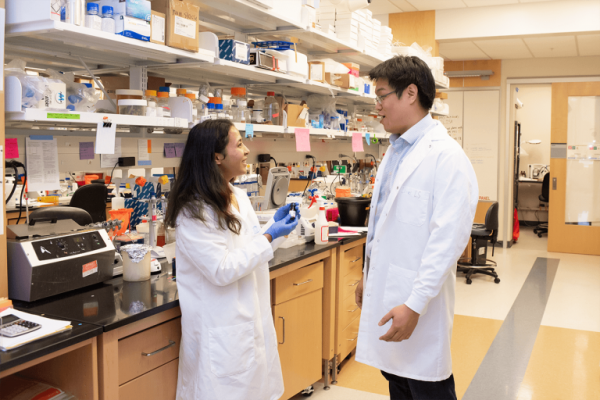August 11, 2021
University of North Carolina Eshelman School of Pharmacy has developed a panel of ultrapotent sperm-binding monoclonal antibodies as option for affordable, non-hormonal female contraception
 Scientists at the University of North Carolina at Chapel Hill are engineering molecularly tuned monoclonal antibodies that can be directly delivered into the vagina for a new type of non-hormonal female contraception.
Scientists at the University of North Carolina at Chapel Hill are engineering molecularly tuned monoclonal antibodies that can be directly delivered into the vagina for a new type of non-hormonal female contraception.
Monoclonal antibodies are known for their ability to fight off invading germs, and are used to treat and prevent everything from cancer to COVID-19. Scientists are now enabling a new application for antibodies: blocking sperm from reaching an egg.
The concept is taking shape after the Carolina researchers showed that their novel antibodies effectively eliminated motile sperm, even at exceptionally low doses in large animal testing designed to mimic typical contraceptive efficacy studies in early human clinical trials. These promising results, which underscore the potential of these antibodies as non-hormonal contraceptive to prevent pregnancy, were published in Science Translational Medicine.
“Many women avoid hormonal contraception because of real and perceived side effects,” said Samuel Lai, professor in the Division of Pharmacoengineering and Molecular Pharmaceutics at the UNC Eshelman School of Pharmacy. These effects can include irregular bleeding, nausea, depression, weight gain and migraines.
And for some women, estrogen-based hormonal contraception can be harmful. “There is a major unmet need for alternative, non-hormonal contraceptives for many women,” he said.
There’s been rapid expansion of use of monoclonal antibodies to address diseases. Monoclonal antibodies are synthetic versions of the natural antibodies that the immune system uses to disable invading germs or cancer cells. They are designed to bind to and eliminate unwanted species in the body and, in this case, target sperm.
“We were inspired by infertility that occurs in some women who develop antibodies against their partner’s sperm,” said study first author Bhawana Shrestha, a doctoral student in the Department of Microbiology and Immunology at the UNC School of Medicine and graduate research assistant at the school of pharmacy.
But monoclonal antibodies were traditionally expensive to produce, which puts their usefulness as an affordable contraceptive up in the air. They are also not very effective at clumping sperm together into aggregates that are too large to swim through mucus, due to limited number (two) of binding arms available on each antibody molecule. These shortcomings have limited prior efforts to advance antibodies as contraceptive.
To overcome these shortcomings, the researchers took the binding arm of an antibody isolated from an infertile woman and targeted a unique surface antigen present on human sperm. They then prepared a panel of antibodies with as many as six to 10 binding arms.
“Using the highly multivalent IgG platform, we engineered antibodies that were at least 10- to 16-fold more potent at agglutinating sperm and reducing sperm permeation through mucus than the best known antibody. This in turn prevents sperm from swimming through mucus and reaching the egg altogether, enabling potent, non-hormonal contraception with a pharmacological mechanism that has already been validated in women,” Shrestha said.
“We think these second-generation molecules will provide not only greater potency but will translate to lower costs that make the approach cost-effective,” Lai added. In sheep that have size comparable reproductive tracts as female humans, just tens of micrograms of the antibodies dosed into the vagina effectively eliminated all progressively motile sperm. For comparison, grams of antibodies are dosed with Lilly’s and Regeneron’s antibody cocktails that have received Emergency Use Authorization for treating COVID-19, a 60,000-fold difference.
The new type of contraceptive can be delivered using an intravaginal ring that steadily releases the antibodies across the fertility window, or a dissolvable film that can be inserted vaginally before sex. The molecule has been licensed by Mucommune, a startup spun out of the Lai Lab. Mucommune will be leading preclinical and clinical development efforts.
“By avoiding exogenous hormones and creating a women-controlled contraceptive method, we believe the antibodies developed here could meet the contraceptive needs for millions of women, help to reduce the number of unintended pregnancies, and alleviate the health care costs of unintended pregnancies, which some estimate are in excess of $20 billion per year,” Lai said.
The study team includes researchers from the UNC-Chapel Hill, University of Texas Medical Branch, Boston University School of Medicine and Mucommune, LLC. The National Institutes of Health, Eshelman Institute of Innovation, the Packard Foundation for Science and Engineering, the National Science Foundation and the PhRMA Foundation funded the study.
Latest News

RASP poster presentations capture student research

Delesha Carpenter promoted to full professor


